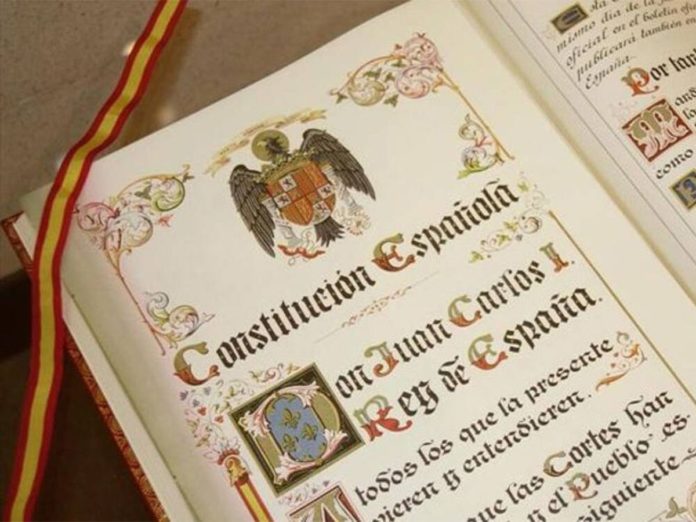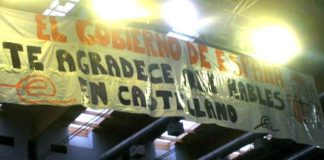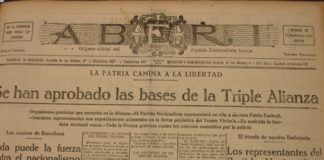Last 6 December, the Spanish celebrated their customary Constitution Day. By contrast, this terrible date reminds us of our political subjugation. While some sectors and individuals of our nation worked that day, most Basque workers held the 6 December as a bank holiday, the first of a long weekend, the gateway to a leisurely parenthesis. We need our own work calendar, and not acting in its favour is yet another sign of our Spanish assimilation, favouring the oppressive State.
The Basques have nothing to celebrate on 6 December. First of all, because we are not Spanish. Secondly, because there are no slaves who celebrate the day of their enslavement, as there are no prisoners celebrating the day of their imprisonment. The Spanish Constitution is a cage for the Basques, the legal and political framework that denies our national rights. At a time when so much is being said about restoring historical memory, we happen to be going through amnesia, ignoring the fact that the Basques rejected that foreign constitution 45 years ago. In 1978, when the Spanish Constitution was put to the test in a referendum for its ratification, only one-third of the electorate in the Peninsular Basque Country (the Basque Country under Spanish rule) supported it. The Basques, unlike the Spanish, did not welcome that Constitution, so it manifestly lacks any authority in the Basque Country. We must also remember that neither the rightist nor the leftist Basque nationalists supported the Spanish Constitution.
The social and political drive that led Basque nationalists to clearly reject it in 1978 is still fully valid. This is the list of the denial of our national rights as presented in the constitution:
1.- The 1978 Constitution proclaims Spanish unity, laying out no avenues allowing for a democratic secession. The army is attributed full powers to guarantee that does not happen.
2.- It does not recognize the national character of the Basque Country. It acknowledges just one nation, the Spanish.
3.- This central legal text emphasizes the hegemony of the Spanish language, which all citizens of the Spanish state must know. It does not go the same with our own language.
4.- It imposes Spanish nationality on all citizens of the Peninsular Basque Country.
5.- It lays out the conditions for the political division of the Peninsular Basque Country.
The Spanish State’s lack of legitimacy in the Basque Country sinks its roots not only in history, but also in a fundamental political question, i.e. the Basques did not accept the political framework imposed on us by the Spanish in 1978. We are therefore equipped with a full range of sound, legitimate grounds to denounce the Spanish position in international courts, since we rejected the imposition of a Spanish unity, the monarchy, the hegemony of the Spanish language, the mandatory Spanish nationality, the division of the Peninsular Basque Country. They forcibly established here their political framework and made both the army and the judiciary accountable for upholding the status quo. Political dissent is punishable by imprisonment, as we Basques and Catalans know. As long as we are subject to the Spanish constitution, there is no democracy for us.
This was not the first Spanish constitution we rejected. The earliest one was also condemned by the Basques, since it overruled our own original Constitution. The famous 1812 Constitution of Cadiz proclaimed the Spanish nation, which united the Spanish of both planetary hemispheres. At the same time, it suppressed the Kingdom of Navarre and the foruak, the legal and institutional system of Biscay, Gipuzkoa and Araba (Alava). Moreover, although nineteenth-century absolutism was a great enemy of the Basque liberties, the widely known foundational law of Cadiz insolently trampled Basque own laws and institutions in the name of the Spanish nation and equality. Then, General Castaños was sent to our representatives with a mission to take an oath of the text.
Just in the same way as we were made to accept this unfortunate code of law under the threat of arms, so the current constitution is guaranteed by the army, always in spite of our will. Let us not forget either the enormous bloodshed spilled in the period extending between both laws. For whether absolutists or liberals, right-wingers or leftists, the Spanish have always ripped their way through the force of arms, by threat, or by war.
Now, just as the Spanish of the other hemisphere cited by the 1812 constitution shook off the imperial yoke, so shall we free ourselves from the servitude to that constitution if we bolster our nation.
Let us turn the 6 December, a strange holiday which compels us to celebrate our submission, into a regular weekday, and begin to proclaim our own calendar for the whole of the Basque Country. Wherever we stand and as far as we can, let us stand up and denounce this constitution and declare publicly, loud enough to be heard by our political parties and institutions, that we aspire to put together our own constitution, and that it is about time we bring this matter to the centre of politics.








